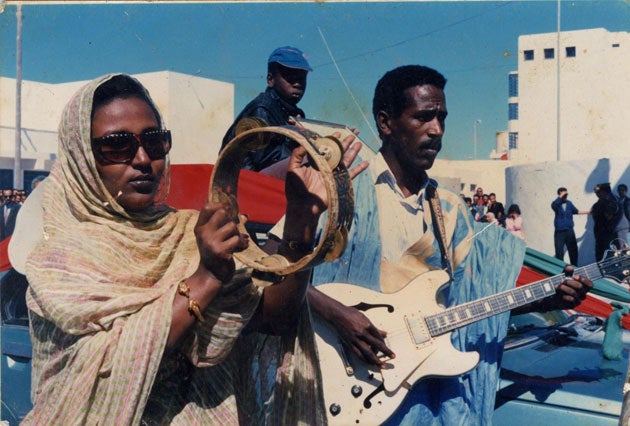Group Doueh, St George's Church, Brighton

In the stillness of the desert young Salmou Bamaar and his friends would gather round a crackly short-wave radio and listen to music from around the world. It was the early 1970's and life in the small Western Saharan town of Auserd was lived in much the same way as it had been for generations.
Living in goatskin tents, subsisting from camels, sheep and goats the radio was one of the few hints off what lay beyond the distant horizon. The first time Bamaar heard Jimmi Hendrix he was deeply affected. "I wanted to be in that band" he tells me.
Kicking off a six-week European tour last week in an ornate Brighton church Bamaar, with his band Group Doueh (pronounced "Doo-way"), has come a long way since those days in the desert playing a guitar made from an empty olive oil can and some fishing line. Nevertheless his music has not strayed too far from its roots. Doueh's sound is steeped in the Saharawi/Hassania traditions. The earthy rippling rhythms which repeat hypnotically may sound dissonant at first but quickly penetrate to the bone. The brash electric tinidit, a traditional stringed guitar, sears through the hallowed space accompanied by the beats of the tbal, a clay skinned drum, a pop-rock organ and wailing female vocals. The songs, drawing from a rich oral tradition of Hassania poetry, speak of love, the nomadic way of life and the pain of war and exile.
Western Sahara, "Africa's last colony", has experience much upheaval over the last three decades. The territory was divided between Morocco and Mauritania by the Spanish when they withdrew in 1976 following the mass mobilisation by the Moroccans known as "the Green March". In February 1976, the Saharawi independence movement, the Polisario Front, declared creation of the Saharawi Arab Democratic Republic and a sixteen-year war ensued resulting in the exodus of an estimated 165,000 Saharawi to refugee camps in the Algerian desert where they have subsisted for over 33 years.
Bamaar is not political by nature. His love is for music and although not affected directly by the war, he has relatives who travelled to Cuba to avoid life in the refugee camps. He feels deeply for the suffering of the Saharawi refugees on a human level and longs for a resolution to this forgotten conflict. But first and foremost he is a musician and he believes that music and politics can be kept separate.
Not everyone agrees. Jim Porter a 70-year-old activist from Kemptown has come to the gig to show solidarity with the Saharawi cause. He has first hand experience of the sensitivity of the Moroccan state when it comes to Western Sahara from his experience earlier this year as part of a humanitarian mission taking a convoy of aid from London to Palestine. At the Moroccan border officials spotted that the map printed on their tee-shirts showed Western Sahara as a separate country and started confiscating them. "I didn't know what was going on" laughs Jim. "This official asked me politely if I had a green tee-shirt and I said 'Sure I have'. Then he asked if he could see it and I said 'Sure you can'. Then he asked if he could have it and I said 'No way. It’s the only one I have.'" Only later did Jim find out that he was the only one of the 280 people on the convoy to have kept his tee-shirt.
Political differences aside, Doueh are remarkable musicians and their debut tour with the Syrian dance music legend, Omar Souleyman, who headlines next month's Sonar electronic music festival, is not to be missed.
Join our commenting forum
Join thought-provoking conversations, follow other Independent readers and see their replies
Comments
Bookmark popover
Removed from bookmarks